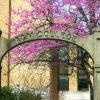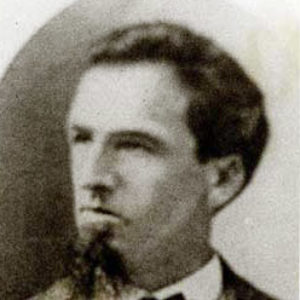calsfoundation@cals.org
Noah Putnam Gates (1832–1909)
Noah Putnam Gates was an important educator in Arkansas in the last few decades of the nineteenth century. He played a particularly influential role in the development of what became the University of Arkansas (UA) in Fayetteville (Washington County).
Noah Putnam Gates was born on November 18, 1832, near Princeton, Kentucky, the son of Nathan Gates and Carolina Davidson Gates. His early education took place in a wide range of schools (predominantly church affiliated) located in Kentucky and Missouri. He attended Chapel Hill College in Chapel Hill, Missouri, and Princeton College in Princeton, Kentucky, before studying at Illinois Normal University and the University of Michigan. He did not receive a degree from any of these schools, but the board of trustees of Arkansas Industrial University (now UA) awarded him an MA in 1880.
Gates married Lucy Cash on July 4, 1860. The couple had nine children.
Gates originally intended to enter the ministry, but his early forays into teaching, efforts undertaken in large part to fund his continuing education, showed him that it was in the classroom that he could be of greatest service. He began a career teaching in public schools—six years in Charleston, Illinois, and then three years in Mattoon, Illinois. In 1869, Gates moved to Arkansas to serve as school superintendent in Little Rock (Pulaski County), and he was serving in that position when, in January 1872, he reluctantly assumed the role as the acting first president of Arkansas Industrial University. The university’s board had had trouble finding a president, but it convinced Gates to take the helm with the understanding that once a suitable successor had been found to serve as president, Gates would assume the leadership of what was called the school’s normal department, the program that focused on teacher preparation. In the meantime, Gates oversaw the school’s beginnings.
With Gates as acting president, Arkansas Industrial University formally began operations on January 22, 1872. It had eight students, a dozen books, and one teacher, Charles H. Leverett. By the end of the year, enrollment had reached 101, with students coming from towns across the state. As president, Gates did most of the original organizing, supervised construction of buildings, taught classes, and generally brought a human touch to the campus. As professor of mental and moral philosophy, he got to know many of the students personally. In addition, he undertook efforts to reach out to the developing community so as to enhance both “town-gown” relations and the development of the town. During Gates’s tenure, it was illegal to bar black students. However, in an effort to avoid controversy, the school’s few African American students were separated from the rest of the community, forced to live in buildings off campus and taught by Gates himself in the off hours as his other duties allowed.
In June 1873, Gates turned over the presidency to General A. W. Bishop, assuming the leadership of the normal department. However, when Bishop stepped down in 1875, Gates served as president again from 1875 to 1877, when he was succeeded by D. H. Hill. Gates returned to the position of chair of the normal department, where he served until 1884. At that point, he left the university to become superintendent in Fort Smith (Sebastian County). In 1889, he assumed the same position in Fayetteville; he stayed there until 1902, when health issues forced his retirement. As had been the case with his initial appointment as superintendent in Little Rock, his efforts in both Fort Smith and Fayetteville centered on organizing the basic school system.
Gates died on April 18, 1909, in Little Rock. His funeral was held in the university chapel in Fayetteville.
For additional information:
“Noah P. Gates.” University of Arkansas, Office of the Chancellor. https://chancellor.uark.edu/about/presidents-chancellors/noah-p-gates.php (accessed April 6, 2018).
Reynolds, John Hugh, and David Yancey Thomas. History of the University of Arkansas. Fayetteville: University of Arkansas, 1910.
William H. Pruden III
Ravenscroft School
 Early Twentieth Century, 1901 through 1940
Early Twentieth Century, 1901 through 1940 Education, Higher
Education, Higher Post-Reconstruction through the Gilded Age, 1875 through 1900
Post-Reconstruction through the Gilded Age, 1875 through 1900 Noah Gates
Noah Gates 




Comments
No comments on this entry yet.